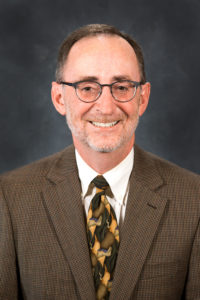- FAER-Helrich Lecture: Found in Translation: MASKs, Coffin Nails, and Other Curiosities
- 1:45-2:45 p.m. Monday
- South, Room 206
Translational research in anesthesiology takes center stage on Monday at the Foundation for Anesthesia Education and Research (FAER)-Helrich Research Lecture. This year, the lecture will be presented by David O. Warner, M.D., Professor of Anesthesiology at Mayo Clinic College of Medicine and Associate Director of Mayo Clinic Center for Clinical and Translational Sciences (CCaTS), Rochester. The lecture recognizes outstanding scholarship by a scientist and is designed to encourage early-career anesthesiologists and trainees to consider a career in research and teaching.
Dr. Warner is passionate about translational research, especially its later stages.

David O. Warner, M.D., presents this year’s FAER-Helrich Research Lecture.
“There are many challenges in translational research. To me, the greatest challenge is the implementation of new advances in knowledge,” Dr. Warner said.
Most of the funding for translational research is for the early phases, from laboratory discovery to initial human trials. Much less funding is available for how a new drug or device actually gets used, he said.
“We need to be careful to pay attention to all phases of translational research. It is not enough just to discover a new drug or device — we need to study how best to use it in a population for maximum benefit. Unfortunately, the misapplication of even a potentially beneficial innovation can cause harm,” Dr. Warner said.
As an example, he points to the current opioid epidemic.
“In the early 1990s, it was recognized that we needed to improve pain management, which resulted in many initiatives to expand the use of opioids. But we didn’t focus on how we should actually use opioids in practice — we simply let marketing take its course,” he said. “Now we are suffering a largely man-made epidemic, with thousands of deaths each year.”
This last phase of translation includes implementation research, which has only recently been recognized as a science. This relatively new field is still not familiar to many clinicians and researchers. Its goal is to evaluate ways to study how to change both practice and policy to best apply innovations in real-world settings.
Dr. Warner is involved in several projects within implementation research, including the implementation of tobacco use interventions.
“We have many effective methods for tobacco cessation, but they’re seldom used,” he said. “We need to embed into routine practice the interventions proven to help patients quit smoking, which not only can reduce perioperative complications but can add years of life to patients.”
In his lecture, Dr. Warner will highlight both the challenges and benefits of translational research, focusing on specific problems in perioperative medicine. There are not enough anesthesiologists involved in translational research overall and in implementation research particularly, which Dr. Warner calls a “missed opportunity.”
“Many clinicians are involved in quality improvement initiatives, which can benefit individual practices. But we can also approach quality improvement from a research perspective to learn in a more general way what works,” he said. “Then clinicians can share their experiences and instead of a practice benefit for one, there can be a practice benefit for many.”
Return to Archive Index